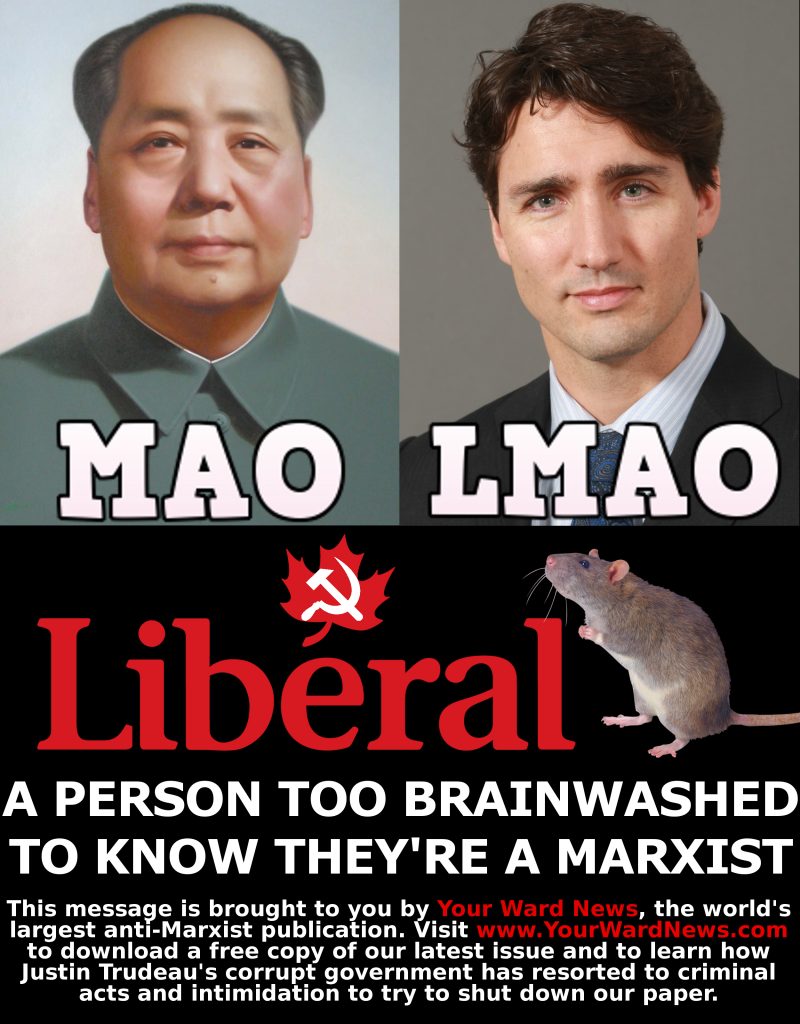Canadian intelligence warned PM Trudeau that China covertly funded 2019 election candidates: Sources
![]()

By Sam Cooper Global News Published November 7, 2022 11 min read

Canadian intelligence officials have warned Prime Minister Justin Trudeau that China has allegedly been targeting Canada with a vast campaign of foreign interference, which includes funding a clandestine network of at least 11 federal candidates running in the 2019 election, according to Global News sources.
Delivered to the prime minister and several cabinet members in a series of briefings and memos first presented in January, the allegations included other detailed examples of Beijing’s efforts to further its influence and, in turn, subvert Canada’s democratic process, sources said.
Based on recent information from the Canadian Security Intelligence Service (CSIS), those efforts allegedly involve payments through intermediaries to candidates affiliated with the Chinese Communist Party (CCP), placing agents into the offices of MPs in order to influence policy, seeking to co-opt and corrupt former Canadian officials to gain leverage in Ottawa, and mounting aggressive campaigns to punish Canadian politicians whom the People’s Republic of China (PRC) views as threats to its interests.
CSIS told Global News it could not answer some questions for this story. But the service confirmed it has identified the PRC’s foreign interference in Canada, which can include covert funding to influence election outcomes.
“The Chinese Communist Party … is using all elements of state power to carry out activities that are a direct threat to our national security and sovereignty,” CSIS stated.
The briefings did not identify the 2019 candidates. But the alleged election interference network included members from both the Liberal and Conservative parties, according to sources with knowledge of the briefs.
Global News was not able to confirm from the sources which cabinet ministers may have been privy to the briefs nor the specific timing that the information was reportedly shared. 2:21 Canada ‘creating new tools’ to protect institutions against China, others seeking to influence elections
2:21 Canada ‘creating new tools’ to protect institutions against China, others seeking to influence elections
Chief among the allegations is that CSIS reported that China’s Toronto consulate directed a large clandestine transfer of funds to a network of at least eleven federal election candidates and numerous Beijing operatives who worked as their campaign staffers. Advertisement
The funds were allegedly transferred through an Ontario provincial MPP and a federal election candidate staffer. Separate sources aware of the situation said a CCP proxy group, acting as an intermediary, transferred around $250,000.
The 2022 briefs said that some, but not all, members of the alleged network are witting affiliates of the Chinese Communist Party.The intelligence did not conclude whether CSIS believes the network successfully influenced the October 2019 election results, sources say.
CSIS can capture its findings through warrants that allow electronic interception of communications among Chinese consulate officials and Canadian politicians and staffers.
Sources close to this situation say they are revealing details from the 2022 briefs to give Canadians a clearer understanding of China’s attacks on Canada’s democratic system. Out of fear of retribution, they have asked their names be withheld.
In response to the briefing details, experts say the alleged interference points to weakness in Canada’s outdated espionage and counterintelligence laws, which sophisticated interference networks run by China, Russia and Iran are exploiting.
Still, the 2022 intelligence asserts that China conducts more foreign interference than any other nation, and interference threats to Canada increased in 2015 when Chinese president Xi Jinping elevated the CCP’s so-called United Front influence networks abroad.
The Prime Minister’s Office (PMO) did not directly answer a series of questions from Global News, including whether or not Prime Minister Trudeau was briefed in 2022 on Canadian intelligence that alleged China had covertly funded a clandestine network of candidates in the 2019 election.
It also did not respond to a question on the need for tighter federal rules against foreign influence on Canadian politics.
“Protecting Canadians’ security is our top priority. Threats, harassment, or intimidation of Canadian citizens are unacceptable, and all allegations of interference are investigated thoroughly by our security agencies,” a statement from the PMO said. “As threats evolve, so must the methods used to address them. That is why the Prime Minister has given the Minister of Public Safety the mandate to improve collaboration between Canadian security agencies.”
Conservative Party leadership did not respond to Global News questions by deadline for this story. 0:37 China responds to Trudeau, Global News investigation, says it has no interest in ‘Canada’s internal affairs’
0:37 China responds to Trudeau, Global News investigation, says it has no interest in ‘Canada’s internal affairs’
“We simply don’t have a prosecutorial end game to deal with foreign interference,” said Dan Stanton, a former CSIS officer who studies Chinese interference, but isn’t privy to recent CSIS reporting. “The sophistication of the threat: it is not the guy with the fedora and black coat, like the old days with the KGB. The whole point of influence networks is that anyone can be used by a foreign state as a co-optee, or agent, or source.”
Stanton and other experts told Global News that CSIS benefits from modernized counter-terror laws that have enabled the service to mitigate terror planning and funding networks since 9/11, but Canada’s espionage laws are stuck in the Cold War era.
“So, until we make legislative changes on interference,” Stanton said, “it’s just CSIS telling our politicians, ‘Hey, be careful out there.’”
In April 2021, a private members bill in the House of Commons called for a foreign influence registry, but it did not become law.
Kenny Chiu, the B.C. Conservative MP who wrote the bill, was subsequently targeted by the CCP’s election interference network, sources said. Chiu says his law would have compelled anyone working for hostile regimes, such as Russia and Iran and China, to declare their interests, and this transparency would protect Canada’s democracy.
The Toronto Consulate and Chinese officials in Ottawa did not respond to questions from Global News about allegations in the 2022 briefs.
Money and influence
Interference on Canadian soil is orchestrated by the CCP’s powerful United Front Work Department, which mobilizes large sections of society abroad to fulfill Chinese Communist Party objectives, according to the 2022 briefs.
United Front operations can include politicians, media, business, student and community groups, and are aimed at consolidating support for CCP policy as well as targeting critics and the causes of ethnic groups seen as “poisons” by the CCP, such as Uyghurs and Tibetans.
Several federal candidates from Canada’s 2019 federal election met with China-based United Front Work Department officials, the intelligence alleges, but did not identify the politicians. Advertisement
While Xi’s United Front is not itself an espionage agency, intelligence briefs allege its networks in Canada facilitate interference operations by China’s foreign espionage service, the Ministry of State Security.
The briefs also reported that Xi’s United Front operates through Chinese consulates in Canada, from which officials direct funds into Canada’s political system, using CCP proxies.
The CSIS briefs also point to the 2014 imbroglio over Toronto District School Board’s partnership with the Confucius Institute, China’s controversial state-funded, culture-education program. Many parents, teachers and students opposed the involvement of these schools, which are guided by the United Front Work Department, according to the U.S. State Department.
According to the briefs, the Toronto Chinese Consulate allegedly transferred $1 million to unidentified proxy groups, which in turn organized protests to support the continued integration of the program into Toronto’s district school board system. That effort ultimately failed when the TDSB voted to sever its ties to the organization.
But China’s alleged United Front campaigns extend beyond financing to the co-opting of politicians and harassment of critics.
One of the more dramatic allegations from the briefs pertained to a pivotal February 2021 vote in the House of Commons, in which members would either support or reject a United Nations resolution declaring China’s treatment of the Uyghur people a genocide.
The intelligence also alleges that, in the aftermath of the House vote, Chinese intelligence agents conducted in-depth background research into MPs who voted in favour of the resolution, declaring China guilty of genocide.
The agents studied the ridings of specific, targeted MPs in order to learn what industries and companies were present and whether these companies had economic links to China.
The objective was to judge whether China could leverage the local economies of Canadian politicians seen as the CCP’s enemies, sources said.
In addition, it was alleged that before the September 2021 federal election, a small number of MPs reported they feared for their families and their reputations and believed they were being targeted in operations to hurt their election chances.
One of the MPs whom the CCP allegedly targeted, MP Kenny Chiu, said he believes Chinese agents succeeded in smearing him as a racist in WeChat and Mandarin-language media reports. As the member from Steveston-Richmond, Chiu had advocated for transparent elections in Hong Kong, voted in favour of declaring China’s actions in Xinjiang a genocide, and tabled his April 2021 bill calling for a foreign influence registry.
“The CCP didn’t have to send me a death threat, they just tried to kill my political career,” Chiu said in an interview.
“So ahead of the 2021 election, I was given a distancing treatment by Chinese-language media. And during the campaign people were shutting the door in my face. The messages I was getting were, ‘Kenny Chiu is a racist. Kenny is Anti-Asian.’”
Some pundits, however, argued that Chiu swung his riding for the Conservatives in 2019 and the riding simply reverted to the Liberals two years later.
Chinese intelligence in the field
The 2022 briefs alleged that one official in Toronto’s Chinese Consulate directed a 2019 federal election-campaign staffer to control and monitor their candidates’ meetings. These efforts included preventing meetings with representatives of Taiwan, a democratic country that Beijing claims is a renegade province.
This kind of interference extends to elected officials as well, according to the briefs, which referred to instances in which clandestine operatives were placed alongside elected officials in an attempt to control the policy choices of federal MPs.
“I’m not surprised at all,” said Harry Tseng, Taiwan’s deputy minister of foreign affairs and top diplomat in Ottawa. “This type of activity is directed from Beijing in many consulates abroad. I think China can be that coercive because they have a very comprehensive list of Canadian politicians.
And when they can find a connection to China, they can pull a string to influence the Canadians.”
The 2022 briefs also detailed Chinese intelligence efforts to infiltrate, surveil and “mess with” Chinese diaspora communities.
Fenella Sung, a Hong Kong Canadian community leader in Vancouver, said she has long believed that Chinese intelligence has infiltrated Canadian diaspora groups, by using business inducements and “subtle psychological warfare.”
She also believes that China’s United Front controls and funds an “interchangeable” network of candidates and nominations in some British Columbia and Ontario ridings.
Turnisa Matsedik-Qira, a Uyghur-Canadian activist, said many in her community believe Chinese agents monitored and harassed them. She provided photos from her December 2021 Facebook posting that showed one alleged incident. In the post, Matsedik-Qira says she was protesting outside the Chinese Consulate in Vancouver when a van pulled up, and two men jumped out. Advertisement
“One of them spit on me and said, “I wish all your people died,” she said.
“I’m scared and worried for my safety. I think he is connected to the Chinese Consulate, for sure. The Consulate has many people in Canada working for China.”
Coerced Repatriations
The 2022 briefs also shed light on the PRC’s so-called Fox Hunt, a high-profile international campaign in President Xi’s efforts to battle corruption and persuade economic fugitives to return to China.
National security experts argue the Fox Hunt is less about battling corruption and more about the CCP extending tentacles of repression into diaspora communities abroad and clamping down on rivals and dissidents.
The 2022 briefs alleged that one of China’s Fox Hunt targets in Canada had connections to the Politburo, the CCP’s elite inner circle of leaders.
Concern was raised in 2020 when a Chinese police agent worked with a Canadian police officer to repatriate an economic fugitive. In another coerced repatriation, Chinese police brought a Fox Hunt target’s brother and father into Canada and would not allow them to return to China unless the economic fugitive also agreed to return, the 2022 briefs alleged.
A new report from the Spanish human rights NGO SafeGuard Defenders bolsters these suspicions, identifying three alleged secret Chinese police stations in Toronto, among 50 similar worldwide, which are used to repatriate Fox Hunt targets. SafeGuard Defenders cited Chinese state records that connect the Toronto locations to police bureaus in Fujian province.
Dan Stanton, the former CSIS official, and David Mulroney, Canada’s former ambassador to China, said that Canada is more exposed than other Western democracies to China’s interference, and yet as the United States, UK and Australia strengthen their counter-interference laws and ramp up investigations into Xi’s United Front networks, Ottawa remains strangely inactive.
“The two most worrying aspects of this are direct interference in our electoral process, and we’re now seeing evidence of this,” Mulroney said, “and harassment of people in Canada of Uyghur and Tibetan origin who have vulnerable relatives back home.”
Global News also described some of the allegations sources say were briefed to Trudeau in 2022, including China’s election interference and targeting of MPs and diaspora communities in Canada, to Dennis Molinaro, a former senior CSIS analyst and expert on foreign interference, who now teaches legal studies at Ontario Tech University.
Molinaro said if the CSIS intelligence warnings sources say were provided to Trudeau are confirmed as accurate, they raise concerns about why the government hasn’t yet responded by tabling new legislation to counter the threats.
“The level of foreign interference activity you describe is serious and alarming,” Molinaro said. “And if confirmed, the level of interference you describe says to me that foreign adversaries understand the legislative loopholes that exist in Canada and are taking full advantage of them.”



